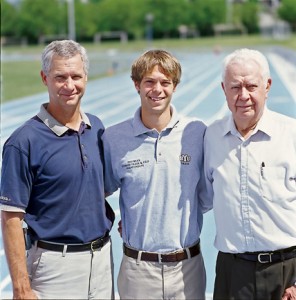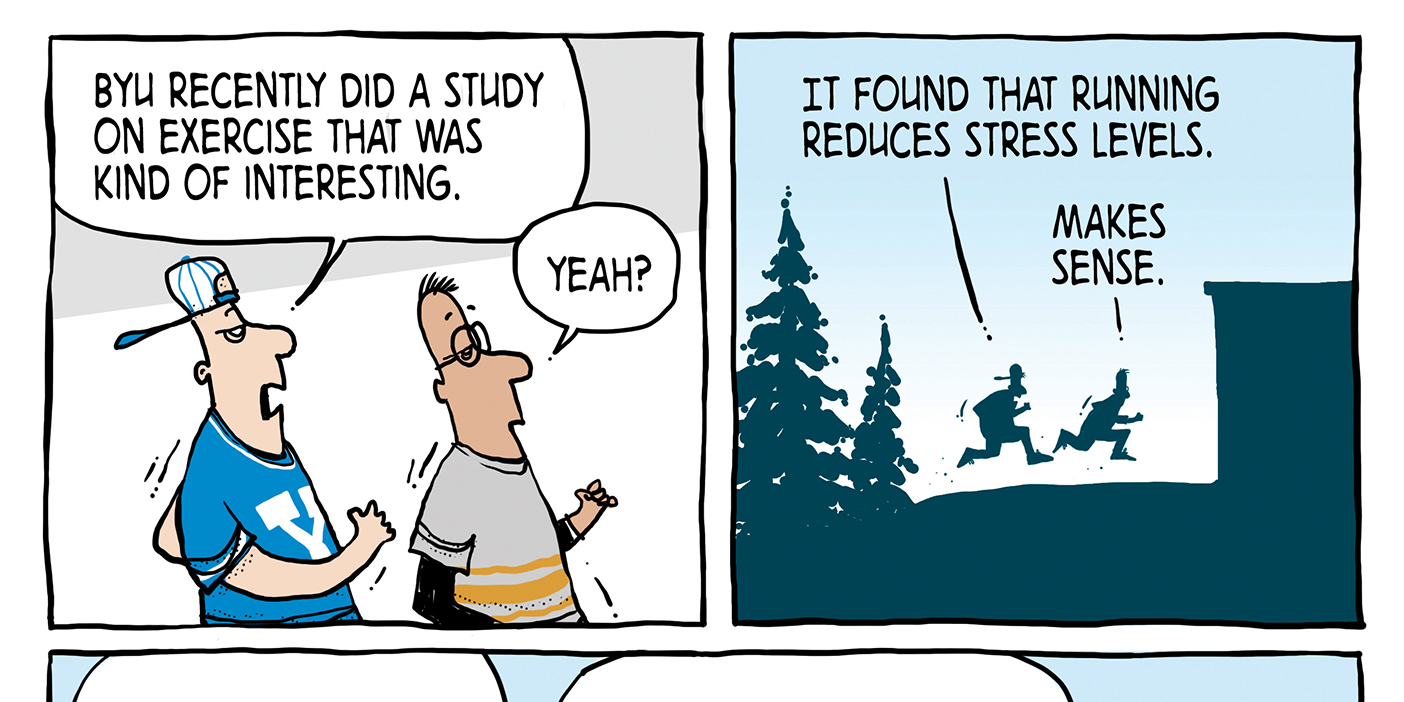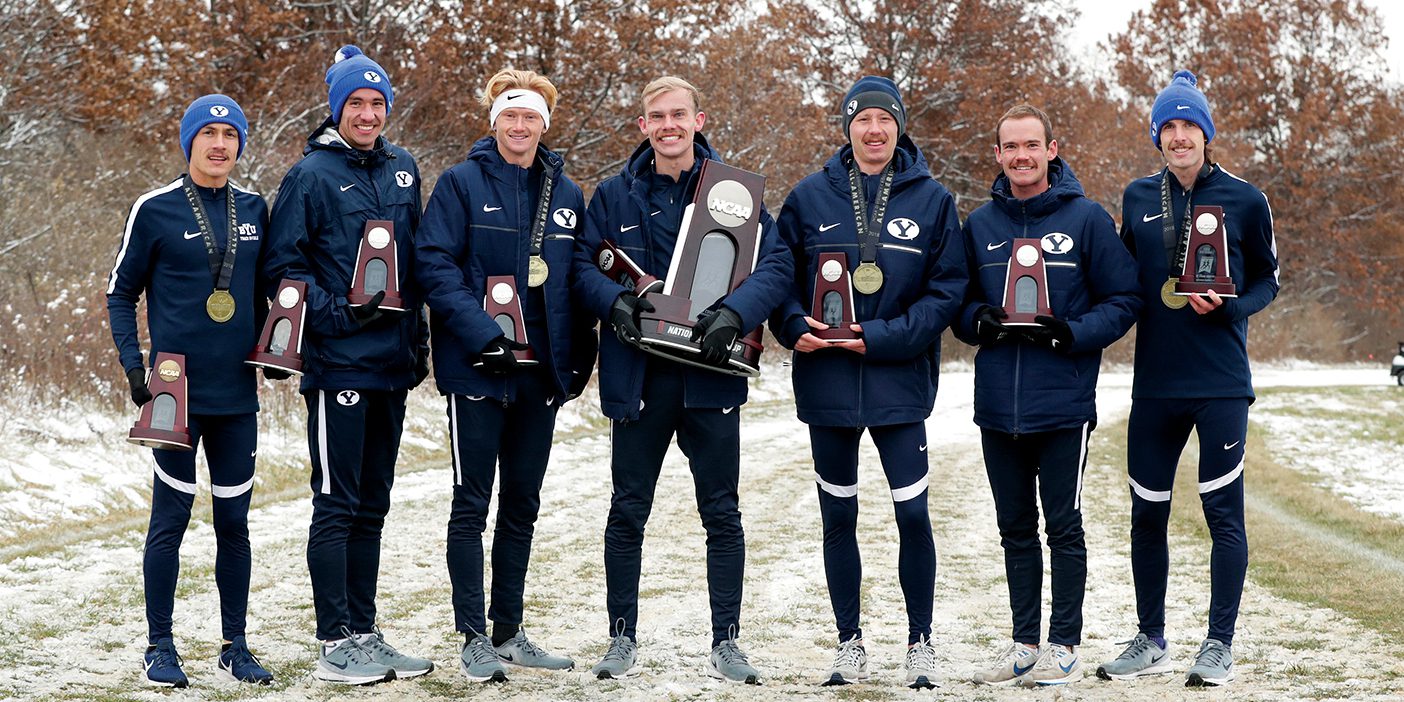Chasing the family tradition, Nathan Robison has endured dismal days on the track to emerge as the latest BYU star.
“Let’s face it, boys,” Coach Edward D. Eyestone, ’85, told us at a team meeting, “we’re all here because we were cut from one team or another.” The statement was painful, yes, but you couldn’t deny that our cross country team was the Deseret Industries of athletics: Coach Eyestone, dumped from his first love, baseball, in the seventh grade; Bryan K. Lindsay, ’06, endured his fourth cut from the basketball team for, you guessed it, a fifth; Joshua M. Rohatinsky, ’07, was a natural baller, but what do you do with a 110-pound center?
And then there’s me: uncoordinated and nerdish, I’d prayed every month that just once my deacons quorum would win a game by some means other than forfeit. So, lacking a jump shot, but receiving encouragement from my grandfather and father, I discovered distance running.
It was inevitable, I guess. My grandfather, Clarence F. Robison, ’49, made the 1948 Olympic games in the 5,000 meters. He returned to become BYU’s head track coach, a position he held for 40 years. During his career he coached dozens of All-Americans and Olympians. He has had a powerful influence in the lives of his athletes, especially his son (my dad), Mark T. Robison, ’82, to whom the BYU-coaching baton was passed four years ago.
Recently BYU honored my grandfather by naming its track and field complex after him. The ceremony took place at the annual Clarence Robison Invitational track meet, which seemed top-heavy with Robisons this year. Not only were half the fans family, but three generations of Robison runners at BYU were represented: one Robison being honored, one Robison overseeing the meet, and one very nervous Robison running.

BYU track star Nathan Robinson, who recently broke the elusive 4-minute mile, stands with his grandfather Clarence, former Olympian and legendary track coach, and his father, Mark, BYU’s current coach and the 2004 MWC coach of the year. Photo by Bradley Slade.
Despite such ample family support, I have experienced trials on the track in addition to my triumphs. Running has taught me, though, that triumph depends on trials and opportunities to fail. If you had tried to tell me this at the end of the 2002 cross country championships in scenic Terra Haute, Ind., however, you would have received the business end of my running spikes. I had just finished in 214th place, almost last.
With the end of the 2002 season and disappointing finishes in both the indoor and outdoor track championships, I nearly hung up my track spikes for good. But in the face of these failures, I found my greatest triumphs. My humiliating finish fueled a fire inside that has driven me to new milestones over the last two seasons: three All-American finishes, a conference title in the mile, and a second-place finish in the NCAA indoor championships.
Nonetheless, at the University of Washington this past indoor season, I found myself on the starting line wondering why I got myself into running. I felt terrified as I glanced down the line of taut bodies ready to spring, the starter already poised and ready to fire. My anxiety could be traced to my feeling that I had reached my limit in the mile, so I had decided I would start this race faster than I ever had. If I went out at a sub-60-second pace every 400 meters, I would finish in under four minutes—every miler’s dream.
Then, mercifully, the starter’s pistol fired and the race began, but my nervousness didn’t subside as usual. What if I only prove to myself that I’ll never be able to go under four minutes in the mile? I wondered.
After 800 meters, the halfway mark, I had an epiphany: Who cares if I can’t finish the race at this pace? If I was going to go sub-four, I was going to have to risk failing. The race turned out to be my best ever. I crossed the line in first, surprising myself, and looked up at the clock. 4:00.00. I had missed it, but just barely. I stepped off the track, pleased with my efforts but determined to do better next time.
Shortly after the race I learned that the track clock had been a bit off. My official time was 3:59.99. I had broken the four-minute mile after all—by one hundredth of a second. This triumph, I realized, along with all the others, was made possible by the chance of failure. I’m glad I didn’t walk off the track that day. Through a simple race I learned a very important lesson: it’s our reaction to the chance of failure that determines our success in life.
Nathan Robison is an English major from Provo.









